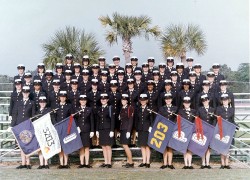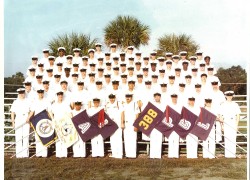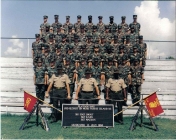Specialty Summary. Operates, evaluates, and manages airborne signals intelligence information systems and operations activities and related ground processing activities. Performs identification, acquisition, recording, translating, analyzing, and reporting of assigned voice communications. Provides signals intelligence threat warning support and interfaces with other units. Performs and assists in mission planning. Maintains publications and currency items. Maintains and supervises communication nets. Transcribes, processes, and conducts follow-up analysis of assigned communications. Related DoD Occupational Subgroup: 123200.
Duties and Responsibilities: Processes, exploits, analyzes and disseminates signal intelligence information. Operates airborne signals intelligence systems and mission equipment. Uses radio receivers, recording equipment, operator workstations and related equipment. Tunes receivers to prescribed frequencies. Performs frequency search missions over specified portions of radio spectrums. Monitors, records, compiles, and examines signals intelligence information. Translates, evaluates, and reports on assigned communications. Records and correlates data and performs preliminary analysis. Identifies and analyzes traffic for reportable significance. Improves analytical methods and procedures and maximizes operational effectiveness. Compiles operational data for mission reports.
Provides signal intelligence information. Compares displays and data with in-flight signal intelligence data and database files. Performs and assists in mission planning and developing air tasking orders. Displays, records, and distributes operational information. Receives, transmits, and relays encoded and decoded messages. Uses coordinate reference systems. Coordinates mission profile requirements. Records special interest mission information. Maintains status of mission aircraft, targets, and air tasking order information. Monitors employment of assigned air assets and operations.
Provides threat warning and actionable intelligence to customers as required. Achieves and maintains situational awareness of impending/ongoing air, ground and maritime combat operations. Employs intelligence information systems to satisfy air, ground, and maritime force intelligence and threat warning requirements. Provides threat warning information to aircrews and other agencies. Coordinates with airborne, ground, and maritime agencies to distribute and relay operational threat and identification data. Transmits identification and other mission information. Knowledgeable of U.S. and allied operations such as interception, interdiction, Close Air Support (CAS), Combat Search and Rescue (CSAR), Combat Air Patrol (CAP), reconnaissance, Offensive or Defensive Counter Air (OCA/DCA), Suppression of Enemy Air Defenses (SEAD), and Special Operations Forces (SOF).
Coordinates and exchanges identification information. Coordinates with aerospace rescue and recovery services and operations. Maintains liaison with reporting agencies required for mission execution.
Manages mission activities. Manages standardization, qualification, reports, records, and other requirements. Ensures accuracy, completeness, format, and compliance with current directives and mission system performance engineering, preventive maintenance programs, and aircrew procedures.
Performs aircrew duties. Demonstrates and maintains proficiency in emergency equipment use and procedures, and egress. Performs pre-flight, through-flight, and post-flight inspections. Operates aircraft systems and equipment, such as electrical, interphone, doors, and exits. Performs preventive maintenance on mission equipment. Ensures equipment and resources are externally clean, functional, and free from safety hazard. Reports malfunctions and observations. Supervises loading and off-loading of classified material and personal aircrew gear. Applies restraint devices, such as straps and nets, to prevent shifting during flight. Ensures access to escape exits.
Maintains technical aids, logs, and records. Compiles and maintains operation records and statistics. Ensures logs, forms, and correspondence are properly completed, annotated, and distributed. Monitors and maintains working aids, and analytical references.
Specialty Qualifications:
Knowledge. Knowledge is mandatory of: a designated language; role and purpose of cryptologic support operations; joint service relationships and operational concepts; organization of national intelligence structure; tasking strategies; radio communications operations theory; communications techniques; operation of acquisition, recording, and processing equipment; communications networks; formats, terminology, and theory of traffic analysis; organization of designated military forces; geography, reporting principles, procedures, and format; procedures for processing and distributing intelligence data; functions and operations of electronic equipment; basic computer operations, and methods for handling, distributing, and safeguarding information.
Education. For entry into this specialty, completion of high school or general educational development equivalency is mandatory. Also, completion of courses in foreign languages, mathematics, keyboarding, and computers is desirable.
Training. For award of AFSC 1A831, completion of a designated airborne cryptologic linguist course is mandatory.
Experience. The following experience is mandatory for award of the AFSC indicated:
1A851. Qualification in and possession of AFSC 1A831. Also, experience performing airborne cryptologic linguist functions.
1A871. Qualification in and possession of AFSC 1A851. Also, experience performing or supervising airborne cryptologic linguist activities.
Other. The following are mandatory as indicated: No record or history of temporomandibular joint disorder or pain. A minimum score of 100 on the Defense Language Aptitude Battery; or demonstrated proficiency in a designated language with an L2/R2 or better on the Defense Language Proficiency Test (DLPT). For entry, award, and retention of these AFSCs: Physical qualification for aircrew duty according to AFI 48-123, Medical Examinations and Standards, Class III medical standards. Qualification for aviation service according to AFI 11-402, Aviation and Parachutist Service, Aeronautical Ratings and Badges. Must maintain eligibility to deploy and mobilize worldwide. For award and retention of AFSCs 1A831/51/71: Demonstrated proficiency in primary language with an L2/R2 or better on the DLPT. Ability to type at a rate of 25 words per minute. Specialty requires routine access to Top Secret material or similar environment. For award and retention of AFSCs 1A8XX, completion of a current Single Scope Background Investigation (SSBI) according to AFI 31-501, Personnel Security Program Management. NOTE: Award of the 3-skill level without a completed SSBI is authorized provided an interim Top Secret clearance has been granted according to AFI 31-501.




